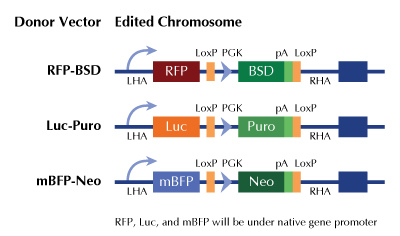CTLA4 Human Gene Knockout Kit (CRISPR)
CAT#: KN210150BN
CTLA4 - human gene knockout kit via CRISPR, HDR mediated
Functional Cassette: GFP-puro Luciferase-Puro RFP-BSD
HDR-mediated knockout kit validation
USD 1,657.00
4 Weeks*
Specifications
| Product Data | |
| Format | 2 gRNA vectors, 1 mBFP-Neo donor, 1 scramble control |
| Donor DNA | mBFP-Neo |
| Symbol | CTLA4 |
| Locus ID | 1493 |
| Components |
KN210150G1, CTLA4 gRNA vector 1 in pCas-Guide CRISPR vector KN210150G2, CTLA4 gRNA vector 2 in pCas-Guide CRISPR vector KN210150BND, donor DNA containing left and right homologous arms and mBFP-Neo functional cassette. GE100003, scramble sequence in pCas-Guide vector |
| Disclaimer | These products are manufactured and supplied by OriGene under license from ERS. The kit is designed based on the best knowledge of CRISPR technology. The system has been functionally validated for knocking-in the cassette downstream the native promoter. The efficiency of the knock-out varies due to the nature of the biology and the complexity of the experimental process. |
| Reference Data | |
| RefSeq | NM_001037631, NM_005214 |
| UniProt ID | P16410 |
| Synonyms | ALPS5; CD; CD152; CELIAC3; CTLA-4; GRD4; GSE; IDDM12 |
| Summary | This gene is a member of the immunoglobulin superfamily and encodes a protein which transmits an inhibitory signal to T cells. The protein contains a V domain, a transmembrane domain, and a cytoplasmic tail. Alternate transcriptional splice variants, encoding different isoforms, have been characterized. The membrane-bound isoform functions as a homodimer interconnected by a disulfide bond, while the soluble isoform functions as a monomer. Mutations in this gene have been associated with insulin-dependent diabetes mellitus, Graves disease, Hashimoto thyroiditis, celiac disease, systemic lupus erythematosus, thyroid-associated orbitopathy, and other autoimmune diseases. [provided by RefSeq, Jul 2008] |
Documents
| Product Manuals |
| FAQs |
| SDS |
Resources
Other Versions
| SKU | Description | Size | Price |
|---|---|---|---|
| KN210150 | CTLA4 - human gene knockout kit via CRISPR, HDR mediated |
USD 1,657.00 |
|
| KN210150LP | CTLA4 - human gene knockout kit via CRISPR, HDR mediated |
USD 1,657.00 |
|
| KN210150RB | CTLA4 - human gene knockout kit via CRISPR, HDR mediated |
USD 1,657.00 |
|
| KN410150 | CTLA4 - KN2.0, Human gene knockout kit via CRISPR, non-homology mediated. |
USD 1,657.00 |
|
| GA101056 | CTLA4 CRISPRa kit - CRISPR gene activation of human cytotoxic T-lymphocyte associated protein 4 |
USD 1,657.00 |
{0} Product Review(s)
Be the first one to submit a review






























































































































































































































































 Germany
Germany
 Japan
Japan
 United Kingdom
United Kingdom
 China
China
